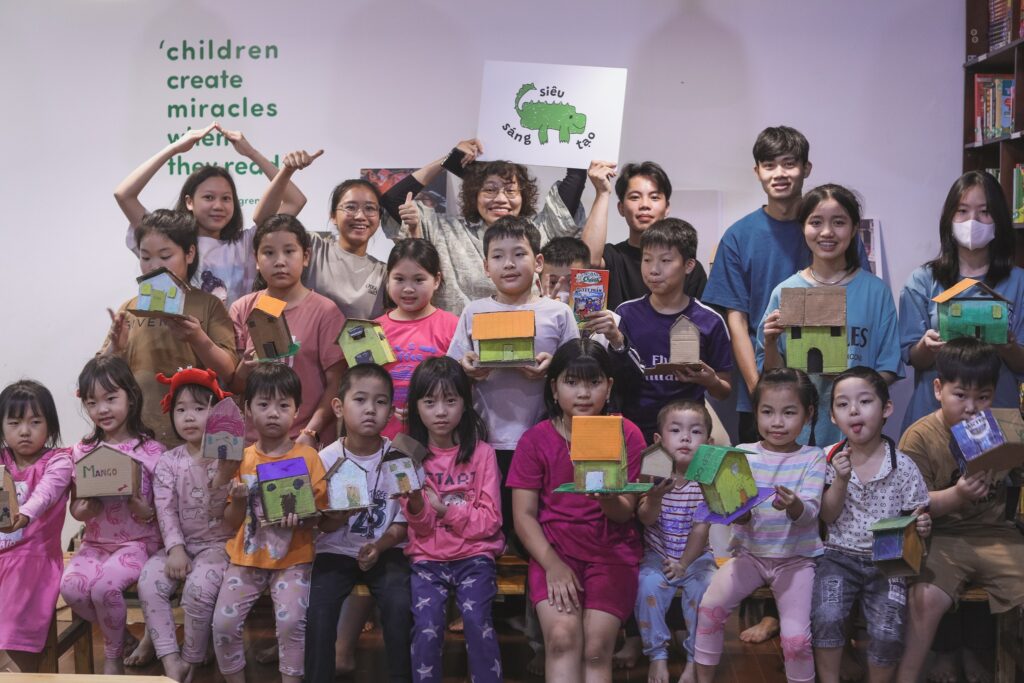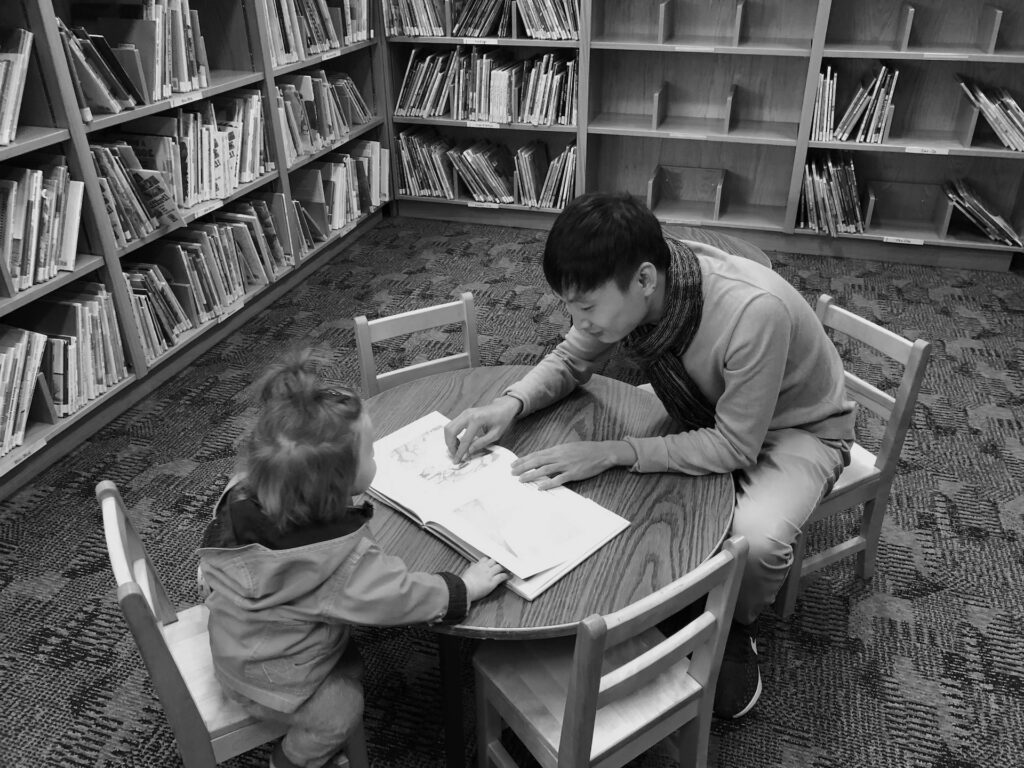PLO 02
Statement of Competency: Understand, engage, and serve users and their communities
As a child, I used to think that a librarian’s job was mainly about managing collections, sitting at a desk, and helping patrons find books when needed. However, through my experience running my own library and studying at the iSchool, I’ve come to understand that being a librarian is much more than that. A truly effective librarian goes beyond books—they are information experts who actively engage with their communities. They don’t just stay behind a desk; they talk to people, learn about their needs, and find ways to help. Whether it’s teaching someone how to identify misinformation, organizing a community workshop, or guiding someone to the right online resources, librarians serve as connectors between people and the information that improves their lives—whether for education, work, or daily living. This realization has shaped my understanding of what it means to actively engage with and serve a community as a librarian.
“In The Heart of Librarianship: Attentive, Positive, and Purposeful Change, Michael Stephens writes, ‘To truly serve, librarians must first listen and understand, then engage with intention, building bridges between information and the people who need it most.’ I deeply resonate with this statement. To fully understand and support users, we must first understand our profession and its role in society. Working in a library is not simply about managing collections; it’s fundamentally about people, individuals within our communities. This human element makes our profession both challenging and exciting. A deeper understanding of these communities comes only through proactive, direct engagement: by listening, interacting, and taking meaningful action. Based on these engagements, it becomes crucial to assess and respond to the diverse needs of user groups, advocate for equitable access to information, and implement educational and community-driven initiatives. To me, our profession exists because of people and for people.
2.1 Assess the Needs and Goals of Users and Communities
Throughout my childhood and student years, I was an eager reader. My love for books even led me to start my first business in primary school as a comic book rental service. However, it failed quickly, likely because I misjudged the actual demand. My friends didn’t share the same passion for reading, nor did they have the money to rent books.
After graduating from college, I had no plans to become a librarian. With a degree in journalism and communication, I presumably should pursue a career in media and marketing. However, in 2013, as a native of my community, I witnessed firsthand the lack of access to books and educational resources. Recognizing this gap, my friends and I co-founded Duong Lieu Library to provide children and young people with books and learning opportunities. What began as a small initiative soon grew into a thriving community hub. At that time, I didn’t see myself as a professional librarian, nor did I fully realize that my work was rooted in assessing and responding to community needs. However, as the library rapidly expanded, serving thousands of children, I recognized the importance of developing my expertise to sustain its growth. Drawing from my own experiences as a lifelong reader, I understood what people in my community needed and worked to provide those resources. With no formal training in librarianship, I designed programs specifically for children and young people, ensuring that the library became more than just a place for books. Some of the programs/events I organized in my library such as: Being future inventor; Pokemon Read; Rubik’s cube competition; Some free classes: calligraphy for first graders, karate class, drawing class, milk tea making class…etc.
Through continuous engagement with the community, I identified key user needs and expanded our offerings to include programs that fostered reading, learning, and personal development. Looking back, I realize that my early business failure stemmed from a lack of understanding of actual user needs—something I have since worked hard to improve. This experience has shaped my approach as a librarian, reinforcing the importance of listening, assessing, and actively engaging with the community to create meaningful and sustainable services.

2.2 Engage Diverse Users and Communities with Empathy and Cultural Competence
A significant milestone in my journey came in 2019 when I traveled to the United States as a visiting intern at Missoula Public Library. This four-week experience expanded my understanding of how libraries can serve diverse users with empathy and cultural awareness. I engaged directly with underserved communities through a mobile library initiative that delivered books and internet access to people experiencing homelessness. I also supported weekly book delivery services to nursing homes and helped transport materials to a remote library in Lo Lo, a Native American community.
These experiences taught me the importance of cultural sensitivity, active listening, and respect for each community’s unique needs. One small but impactful detail was the use of large-print books for elderly patrons as an example of thoughtful, inclusive service design. Eventually, this internship deepened my understanding that equitable library service requires more than access; it demands a genuine effort to understand each group’s context and respond with compassion and adaptability.

2.3 Elicit the Voices of, Advocate for, and Collaborate with Users as Community Partners
Continuing my work with Duong Lieu Library, I prioritized building meaningful connections with the patrons who visited. Through daily conversations, I deepened my understanding of their needs, interests, and challenges. These interactions—whether with children, teens, college students or volunteers, strengthened trust and reinforced the library’s role as a welcoming space for the community.
As the library evolved, so did my role. I moved beyond organizing small events to designing and implementing five core programs tailored to different community needs:
WeTalk – A cultural communication project aimed at preserving local voices and knowledge.
WeHere – A mental health support program for high school students and parents.
WeDesign – A graphic design initiative for college students with creative interests.
WeJoy – A children’s program fostering creativity through handicrafts and artistic education.
WeNature – A sustainability program encouraging environmental responsibility.
Despite being a volunteer-run organization, we host over 50 events annually, demonstrating our commitment to diversity, empathy, and cultural engagement.
One example of how we elicit voices, advocate for, and collaborate with our users is WeTalk, a project designed to amplify local voices and preserve community knowledge. WeTalk was developed in response to the need for spaces where people could share their perspectives, document local wisdom, and engage in meaningful discussions. This initiative includes multiple formats to ensure accessibility and participation across different groups:
- WeTalk Confession – An anonymous platform for community members to express their thoughts.
- WeTalk Q – A documentary-style video series capturing everyday life and traditions.
- WeTalk Podcast – Interviews featuring local individuals sharing their expertise and experiences.
- Coffee Talk – Informal knowledge-sharing sessions held in cafés and community spaces.
By creating multiple avenues for participation, WeTalk ensures that individuals have their own spaces to voice their experiences and contribute to the community’s shared identity.
2.4 Provide Equitable, Just, and Culturally Responsive Services and Resources
Equitable access to information is a core principle that shapes my work. To me, equity is not about providing the same resources to all users but about responding to actual needs, adapting over time, and aligning with the library’s user demographics. At Duong Lieu Library, children, teens, and young people make up 90% of our visitors, so we prioritize collections and services that best support their needs. However, this does not mean other user groups are overlooked. Instead, we continuously assess visitation patterns and adjust our strategies accordingly.
Currently, our library houses a curated collection of over 15,000 items, ensuring access to resources for all age groups. To support our diverse community, we offer books in multiple languages, including English, Japanese, Chinese, and Korean. Additionally, we have specialized collections tailored to various interests, such as psychology, nature, local history, and a large manga collection for children and teens. Through these efforts, we strive to create an inclusive space where everyone can find books that resonate with their interests and needs.
2.5 Use Educational Theory, Instructional Design, and Assessment to Develop, Implement, and Evaluate Education, Training, and Programming
In 2024, building on my education at iSchool (Syracuse University), I coordinated a series of ten online training sessions titled “Library Talk,” designed for individuals in Vietnam passionate about managing community libraries. Spanning February to October, these sessions drew hundreds of participants. Each session delved into targeted topics—such as library location, communication within the library, and fostering creativity in library settings—providing practical advice and support to like-minded individuals and librarians serving community libraries throughout Vietnam. By applying instructional design and assessment principles from my academic training, I empowered participants with effective, actionable strategies to maintain thriving library initiatives.
Beyond the sessions, I authored and posted a series of related updates on social media, hoping to share my insights with a wider Vietnamese audience. This experience honed my ability to design, execute, and assess educational programs customized for diverse learner groups.
Moving forward:
Driven by a passion to serve communities in Vietnam, my work at Duong Lieu Library, internships, and academic training at Syracuse University have equipped me with a comprehensive understanding of effective community needs assessment and response. Looking forward, I am committed to applying these skills as a community library leader in Vietnam. My vision includes developing innovative library services that amplify underrepresented voices and create inclusive learning environments. By consistently engaging with users and adapting to their evolving needs, I will contribute to the vital role of community libraries in Vietnam’s development.
Reference:
Stephens, M. (2016). The Heart of Librarianship: Attentive, Positive, and Purposeful Change.
List of program outcomes: